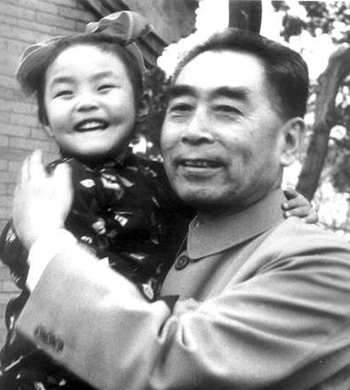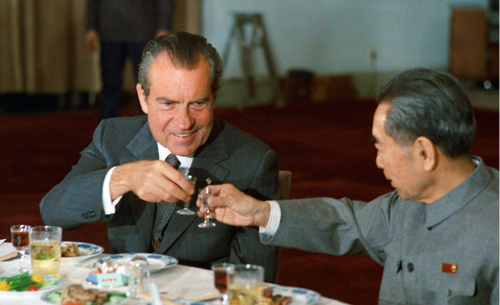Zhou Enlai did much more than shake hands with Richard Nixon. That handshake itself, at a time of high international tension, would not have been possible without an amazing piece of sports history — the ping pong team from America that played in Beijing, with Zhou’s help. He was an avid table tennis player, and he saw the importance of a simple symbol, that everyone in the world understood: people can be friends, and competitors as well.
After the very first encounter between the two national teams, one of the Chinese players presented a gift to one of the American players. This was an unauthorized gesture, and the criticism from some in Beijing was swift: it was proposed that the Chinese player be arrested.
Zhou Enlai heard about this, and put an immediate stop to it. He would not allow a simple, friendly personal act to become a source of conflict. He knew that the seeds of peace are planted by such simple gestures.
During the Cultural Revolution, when so many in China suffered from extreme political policies, Zhou Enlai worked constantly, quietly, behind the scenes to protect people. He helped to ease the consequences for hundreds of thousands of people, and kept communications open with all parties. Through patient reasoning, he helped to hasten the end of a painful time.
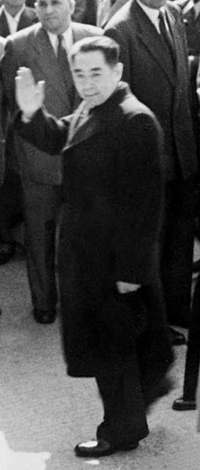 Zhou Enlai used his political power to promote peace instead of resisting too strongly, which would have caused even more serious conflict.
Zhou Enlai used his political power to promote peace instead of resisting too strongly, which would have caused even more serious conflict.
Even the Premier’s own family could not always be protected, and he had to allow many of them to be sent to the countryside to work in the fields. Had he resisted and sought special treatment for his family, they might have suffered even worse.
In some severe situations, where children truly needed protection and there was no alternative, Zhou Enlai personally adopted them, to move them out of harm’s way.
Premier Zhou Enlai attended a political meeting during the Cultural Revolution, at which emotional members of the Red Guard demanded the immediate arrest of a leader who was there with him on the stage.
Instead of confronting or arguing with them, which could have led to violence, Zhou stood up at the center of the stage, and silently turned his back on the crowd.
He stood there until everyone quieted, and became still. Then he turned to them and said, “We do not arrest our brothers.”
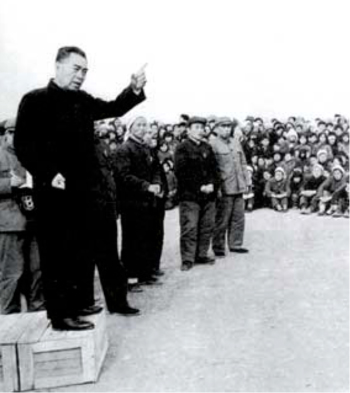 During natural disasters, which are common in an immense country like China, Premier Zhou was often there personally, and quickly. He worked like a common peasant in the fields, helping to clear earthquake disasters for example, and spent time listening to everyone’s concerns, always making sure they were heard in Beijing.
During natural disasters, which are common in an immense country like China, Premier Zhou was often there personally, and quickly. He worked like a common peasant in the fields, helping to clear earthquake disasters for example, and spent time listening to everyone’s concerns, always making sure they were heard in Beijing.
He laughed, ate with everyone and loved to dance with people, to lift their spirits and remind them of better times.
Premier Zhou was flying with some families from one city to another. High over the mountains, the airplane encountered mechanical difficulty; one young girl was terrified and started crying. Everyone put on parachutes, but the little girl could not find hers. The Premier went to the little girl and told her to be calm, not to be afraid. He took off his parachute and gave it to her, and the others all struggled to give their parachutes to him.
He stopped them, and asked everyone to be calm. After a time, the plane steadied, recovered and flew on safely.
Zhou Enlai foresaw clearly the results of his policies of industry, trade and opening to the West.
In 1974, he spoke before the People’s Congress of his vision for the future. He said that no one could have foreseen the achievement of China in the previous 20 years; and that the changes yet to come, as far away as 1994, would be even greater still. They would see China regain its position as a leader of nations.
The Premier and Foreign Minister travelled widely throughout the world — Asia, Africa, Europe, the Americas. He met people of all walks of life, always exchanging cultural gifts and maintaining personal ties for years thereafter.
He established a unique institution — the Chinese People’s Association for Friendship with Foreign Countries. This organization operates outside the orbit of official diplomacy, and aims simply to create positive ties between all people regardless of political disagreements. This organization remains vital and growing to this day, with a stately, parklike headquarters in Beijing and chapters in scores of countries around the world.
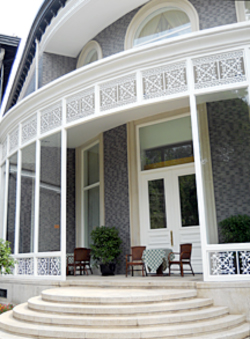 The Zhou Enlai Peace Institute is proud to be connected with the Chinese People’s Association for Friendship with Foreign Countries, and to accept their support.
The Zhou Enlai Peace Institute is proud to be connected with the Chinese People’s Association for Friendship with Foreign Countries, and to accept their support.
Despite his power and influence, Zhou Enlai lived an extremely simple life. He never wasted anything, and wore his clothes, shoes and hats for years until they wore out completely. Much of his salary went to family needs, and to the many orphans he adopted. Even his pajamas were patched over and over again, until the original cloth was almost gone — it was all patches, many colors mixed together.
Upon his death, it was found that Zhou Enlai was virtually penniless. He had kept nothing for himself, and claimed nothing from the vast wealth of China. He gave everything he had, and everything he was, to the people of China.
One story about the famous meeting with Richard Nixon remained a secret for many years, until Nixon’s memoirs appeared.
The story began in the mid-50’s, when America and China had no diplomatic relations, and there was great hostility between the two nations. Secretary of State John Foster Dulles, at a meeting in Geneva, deliberately snubbed Zhou Enlai, refusing to shake his hand. He said that he and Zhou would only meet in a car crash.
Diplomatic memories are long; proud leaders rarely forgive an outright insult like this. So in 1972, Richard Nixon, who knew what had happened in Geneva, made his point as he descended the steps of Air Force One on the tarmac in Beijing.
Chinese protocol required that Premier Zhou Enlai, as the host, should extend a hand to his visitor first. But Nixon moved quickly and took Zhou’s hand warmly, before Zhou could extend it. In his memoir, Nixon said that he wanted to be the first to extend his hand.
Zhou smiled enthusiastically, and accepted the handshake. He was acutely aware of the significance of the President’s gesture, as were a few of those present who knew about the long-ago insult. The visit proceeded with great success.
So it was that the first breakthrough in relations between America and China began with an act of courage, and an act of forgiveness.
Previous 前页 | Next下页 >
